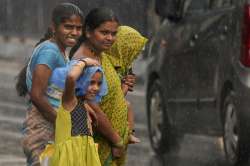Weather update: Kerala to experience monsoon rain in next 48 hours, says IMD
In the meantime, the "very severe cyclonic storm" "Biparjoy" is likely to intensify over the central and adjacent southeast Arabian Sea around Goa within the next 12 hours.

The meteorological conditions are becoming favourable for the onset of monsoon over Kerala within the next 48 hours, said the India Meteorological Office (IMD) on Wednesday. In May, IMD had predicted that the monsoon would arrive on June 4.
Southwest rainstorms regularly set in over Kerala on June 1, with a standard deviation of around seven days.
The circumstances are additionally positive for the additional development of rainstorms into a few additional parts of the South Arabian Sea, Lakshadweep, a few additional parts of the Southwest, Central, and Northeast Bay of Bengal, and a few pieces of Northeastern states during the following 48 hours, the IMD said.
A storm is urgent and uncommon for Kharif crops subject to downpours. Summer, kharif, and rabi are the three cropping seasons in India.
Crops planted during June-July and collected in October-November are kharif.
Rabi refers to crops that are planted in October and November and, depending on their maturity, harvested in January or March.
Summer crops are those that are grown between rabi and kharif.
In the meantime, the "very severe cyclonic storm" "Biparjoy" is likely to intensify over the central and adjacent southeast Arabian Sea around Goa within the next 12 hours.
Within the next twelve hours, it is very likely to intensify into a very severe cyclonic storm. It would move almost north in the next 24 hours and then north-northwest in the next three days, according to IMD.
The Arabian Sea's cyclone-hit areas should be avoided by fishermen, and those out at sea should return to the coast.
In a separate forecast, IMD predicted that the heat wave would likely continue for the next four to five days over Bihar, Jharkhand, West Bengal, Andhra Pradesh, and Telangana.
A heatwave is a state of air temperature that becomes lethal to the human body while uncovered, as indicated by IMD.
If a station's maximum temperature is at least 40 degrees Celsius or higher for plains and at least 30 degrees Celsius or higher for hilly areas, the heat wave is considered.
Also Read | Delhi weather: Cool start to June, cloudy skies and light rain likely during the day
Also Read | Delhi Weather: National capital wakes up to fresh showers; IMD predicts rain in THESE regions